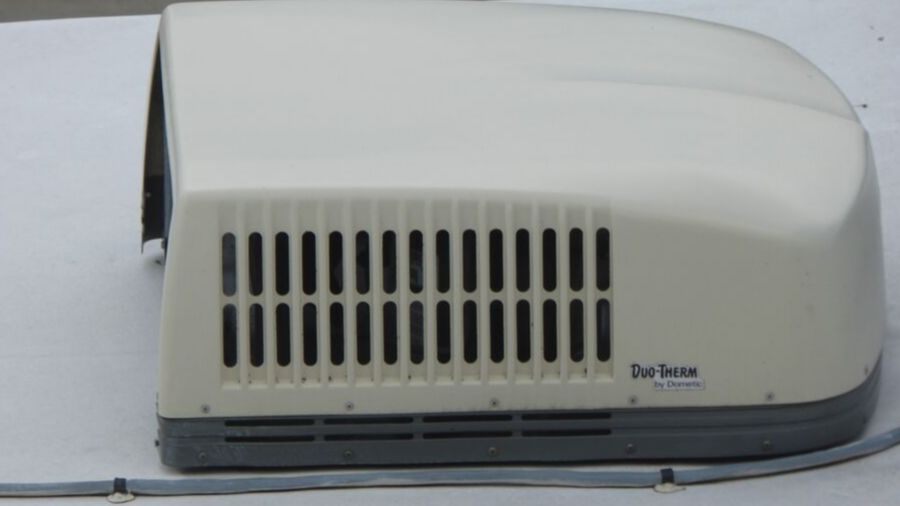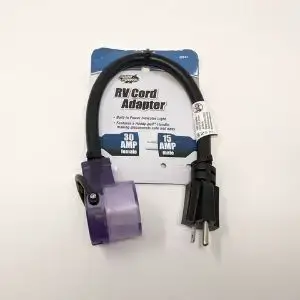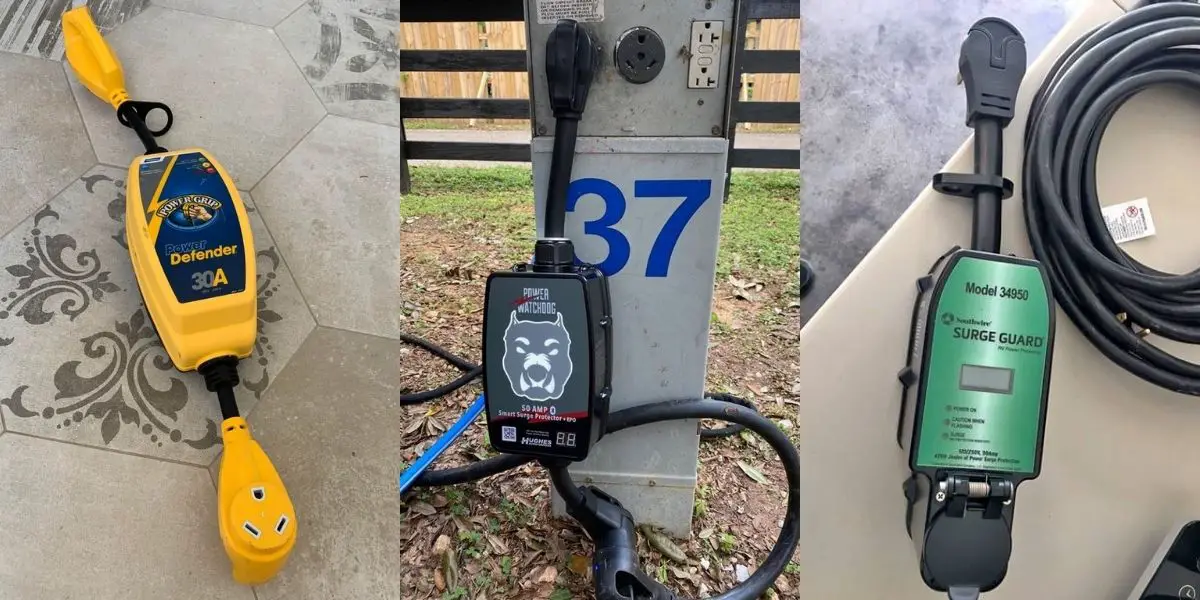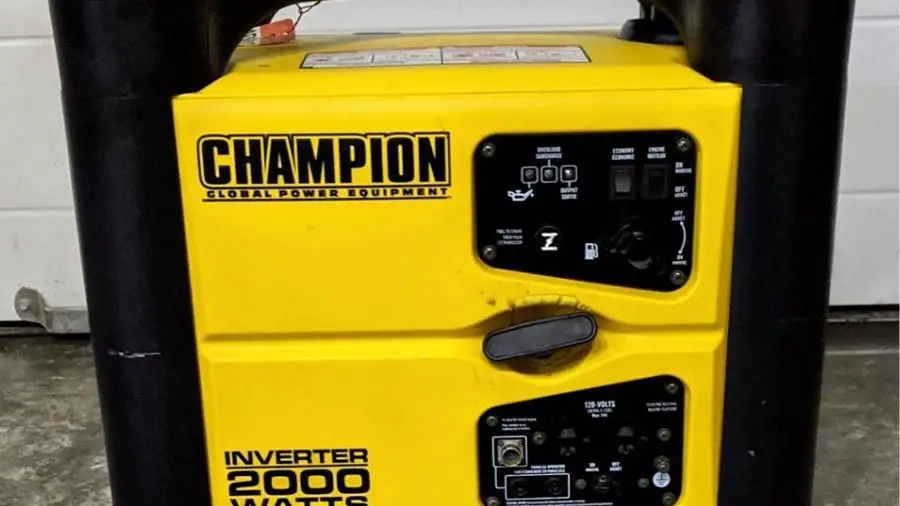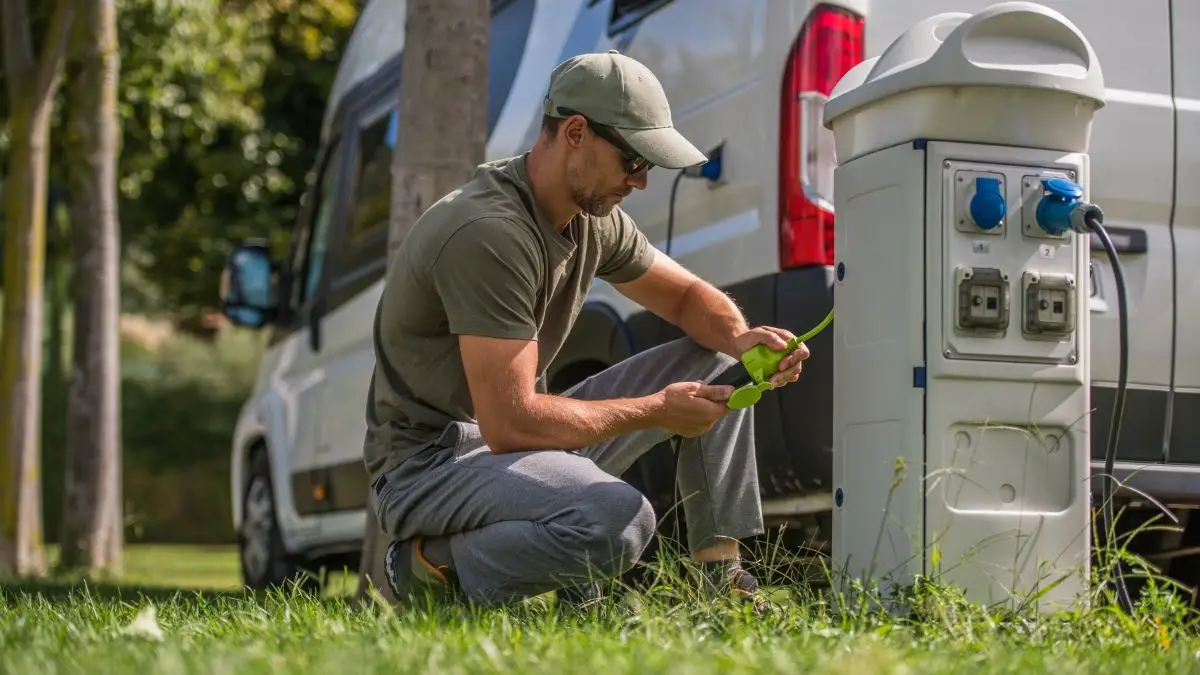Running the air conditioning in your motorhome on a standard 110 home electrical outlet is a common question among owners. You will probably run into this scenario if you are pulling into a friend’s house or sitting in the driveway at home.
It is possible to run your air conditioning on a 110 outlet. (the regular 110/115 outlet is what is found in your house) It is typically 15 amps. The typical RV AC is 13,500 BTUs. The trick in starting and running your RV Air Conditioner so that it does not draw too many amps at the start-up and trips the breaker in your house. Running your A/C through your homes 15 amp plug, there would not be enough amps to run other appliances in your RV, such as a fridge. You will also want to make sure that your A/C is 15,000 BTU’s or less.
Now, there is more to running your air conditioning unit on a 110 circuit than just pulling up and plugging into the nearest outlet. In my research, I have found that there are several factors to consider before you plugin.
How Does Your RV’s A/C Use Electricity: Start Up & Running.
When you turn on your Air conditioner, the fan motor powers up and the cooling compressor immediately starts up simultaneously, which always draws more power to start both items to get the momentum going. The amperage draw is estimated to be anywhere from two to three times what the running power vs once the device is in motion and running.
The majority of the amps are going to the compressor, while a smaller amount is used to start the fan motor. The exact amount can be found on a label on the Air conditioner that tells you how much each device in the AC use.
How Do you Start Your RV’s A/C Without Tripping Your 15 Amp Breaker?
There are two ways to achieve this.
- Install a softstart system on your RV’s air conditioner. Softstart devices starts the motor then the compressor of your Air conditioner a few seconds later there by reducing the surge in amps that causes the 15 amp breaker to trip when a typical AC is turned on. SoftwartRV is a device made for RV air conditioners.
- The other method is to replicate the softstart on your AC by starting your AC by only placing it on fan for about 30 seconds, then switching to the lowest setting on your AC and then slowly increasing the speed or lowering the AC temperature on your AC. The whole process to get your AC up to speed should take about a minute from start to finish. Don’t rush the process or you will trip your 15 amp breaker.
How Do RVs Use Electricity?
Before plugging in, you should make yourself aware of how RV electricity works.
There are two types of currents used to run electricity. The first is AC or alternating current, and the other is DC, which means direct current. Typically, homes run on AC and vehicles will run on DC. Luckily, most RVs come standard with both DC and a system to hook up to AC, such as when you are plugging into a home outlet.
Most RVs happen to come equipped with a 12-volt house battery which is what is necessary to run DC. This battery charges while the vehicle’s alternator is running. However, when parked you will need to charge this battery, or batteries if you choose to go with 2 six-volt batteries instead of the larger 12-volt option, either by solar power or by hooking up to an AC outlet.
Interestingly, most RVs come outfitted with a 120-volt shore power system. When you plug in your RV into shore power you always want to make sure that you are using a good surge protector. If you want to read more about why you may need a surge protector goto this article on it. What does this mean in terms of hooking up to your household electricity? Several things come to mind.
Also of Interest: Can you hook up your Home electric to your RV?
Also of Interest: Why Consider a Surge Protector, before plugging your RV into any power source
How Do I Run My RV A/C On A 110-Home Circuit Using A 30-Amp Adapter?
First things first, you need to know that a typical household electric socket is a 15-amp socket. Occasionally you will see a 20-amp socket, but for the most part, a 110-circuit is going to give you roughly 15-amps.
You can plug your RV into one of these circuits, however, you will not get the full 30 amps from your household electric. Thus, if you want to run your air conditioner from a household outlet, you will need to do a couple of things:
- First off, you will need a 30-amp adapter, similar to this one sold by Amazon, though you can find one at nearly any store that sells camping supplies and/or RV equipment such as Wal-Mart or Camping World. This adapter should connect to a heavy-duty extension cord, or you could go for a dogbone, also found at any store that sells camping supplies, where the adapter and cord connect to the same piece, though the cord is only a few inches long.
- Secondly, you will want to run the a/c on a low setting to ensure that you are using less than the basic 1500 watts of power you get from your house.
- Third, you shouldn’t run anything else in your RV while the air conditioning is running on a home outlet.
If possible, the best choice is the dog bone adapter as the longer your extension cord, also referred to as run, the more you tax the circuit, making it more likely to trip the home’s breaker.
Also of Interest: Can A 2000 Watt Generator Run An A/C?
Also of Interest: Can I plug my 50 amp Rv into 30 amp service without damage?
How Many Amps Does A Camper Air Conditioner Use?
On average, your RV’s roof air conditioner pulls 12-16 amps. So, you can see why the a/c is the only thing that should be running while plugged in. Another thing to keep in mind is that when the a/c kicks in, it will draw up to 7 times the number of amps than it does while just running normally. we just want to reduce that to as much as possible, so the amperage draw does not pop the house breaker.
Now you know why you want to run the a/c on the lowest setting possible. It is to avoid the surge that happens when your air conditioning kicks in and risks damage to your RV, not to mention the home’s circuit breakers.
An alternate way of doing this is to install something called an easy start or a soft starter.
Can You Run A 50-Amp Camper On Home Electric?
If you have a 50-amp RV, then you will need a 50-amp adapter in order to hook up to the house electrical system. While it is possible, you should still use caution when doing so.
You will still only have 15 amps available to you from the house circuit. Therefore, you need the 2 separate adapters. You need to step down from 50-amp to a 30-amp, then step further down from the 30-amp down to the household 15-amp breaker.
The process of hooking up a 50-amp service is the same as hooking up a 30-amp service. The only difference is that you will need an extra dogbone adapter that will allow you to plug in to a 50-amp then subsequently plug that into the 30-amp adapter.
The same rules apply here as they do with the 30-amp service. You want to run nothing but the air conditioning unit and be sure to use the proper extension cord of the right length to avoid the extra heat generated from the run. The cord should be no less than a 10-gauge exterior extension cord.
Can You Leave Your RV Plugged In All The Time?
Keeping your RV plugged in all the time is fine. This will not cause any harm to your Rv or its electrical system. Though, you will need to make sure you keep a good eye on your RV’s house batteries, if they are lead-acid, as the electrolytes can become depleted if left unchecked. It is a good idea to check them at least once a month, but more often is better, and add distilled water if they are low, otherwise, you could be facing extensive damages.
You will also want to make sure that none of your 120-volt appliances are running if you are not using the camper while being plugged in. This can cause damage to your RV as well as deplete the house batteries which are expensive to replace, especially when the damage is easy to avoid.
Can I Plug In My Camper Without A Battery?
By not having a house battery in there is no closed loop for the Rv’s electrical system so nothing will work. Your RV must have at least one house battery of at least 12-volts in one form or another, whether one single battery or by using 2 six-volt batteries together.
It is necessary for your house battery system to be available and charged when you hook up to a shore system, i.e. your house. The reason for this is that the house batteries will act as sort of a backup system if your shore power goes out. If the backup system has no charge and the shore system starts to short out, there will be no reserve to draw from.
Therefore, it is important to keep watch on your house batteries. Never let them go dry and be sure to clean off any corrosion you may see forming on the outside of the batteries. This can cause uneven wear on the batteries which means the life of the battery is in jeopardy.
Can I Run The A/C On Solar Power?
Update: Since the improvements in technology with solar panels, lithium batteries and Direct Current powered Air conditioners, it is possible today to run a small AC unit of 2000 to 3000 watts. Skip to the next section below. Running on regular 13,500 to the 15,000-watt solar panels is still difficult at this time to run on solar panels.
It is certainly possible to run your RV on solar power. However, it is not very practical, and it is expensive. You will need a lot of batteries and solar panels to turn the solar energy into usable electricity. Another thing to consider with solar energy is the size of your rig. The larger the rig, the more electricity you need to run the a/c, which means the more solar panels and equipment needed to run it.
What happens if your camper doesn’t have enough room to carry the number of solar panels needed to run the a/c?
A caveat: it will be a good thing to remember that we are only talking about the air conditioning now, no use of any other electricity is being considered. If your camper doesn’t have enough surface room to handle the solar array needed, then this isn’t going to be an option for you.
There are a lot of positive things about solar power, as well. There is low maintenance once installed and if you happen to park where it is sunny all the time, you will be able to garner a lot of energy this way. This is one of those occasions when you must decide for yourself and your family, whether solar is the way for you to go.
Do They Make 12-Volt DC Air Conditioners?
In the last few years, DC air conditioners have been appearing on the market for RV’s. They use solely DC power to run the motor in the compressor of the air conditioner. DC-powered A/C units make it ideal to run solar panel power as they do not need to have an inverter to produce AC power to run the air conditioner.
They appear to be more efficient than their AC-powered counterparts air conditioners. DC air conditioners are on the small side, designed more for a class B or small trailer. You can watch this video below on the efficiency and running it off solar panels. So if you do your fair share of boondocking a DC air conditioner may be the way to go.
Dometic CoolAir RTX 2000 is the first on the market with the 12v DC powered air conditioner. They have a review on the air conditioner below.
Can I Run My A/C On An Inverter?
It is certainly possible to run your A/C on an Inverter. It would need to have at least 3000 watts running on a pure sine inverter and you would have enough batteries to support the inverter to produce enough amps to run the A/C.
Since most RV AC units are about 1500 watts you would need to be able to have an inverter that can produce at least that type of power. The battery bank would need lithium batteries to produce the needed power to start and run the unit. Plus, additional, solar panels, to recharge or top up the additional power draw from the batteries.
The use of a soft start would also be needed to reduce the initial power draw. (I mentioned that the initial start of an AC can have a draw of up to 7x the running power) There is also a chance you could cause damage to your electrical system due to the power draw to do this, so it is not advisable. If you wanted to try it out or just wanted to have a look at this video below.
Unsure about what an inverter does or how it works, head over and read this article right here for more information.

